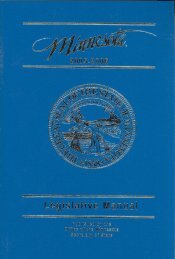Minnesota Board of Pharmacy - Minnesota State Legislature
Minnesota Board of Pharmacy - Minnesota State Legislature
Minnesota Board of Pharmacy - Minnesota State Legislature
You also want an ePaper? Increase the reach of your titles
YUMPU automatically turns print PDFs into web optimized ePapers that Google loves.
Additionally, through the PMP, individuals engaged in potentially unlawful possession and/or diversion<br />
<strong>of</strong> controlled substances have also been identified. Law enforcement <strong>of</strong>ficials have served more than<br />
100 search warrants on the PMP, requesting an individual’s controlled substance prescription history to<br />
support an investigation.<br />
The PMP is not funded through General Fund tax revenues. Instead, it is funded through the licensing<br />
fees collected by the <strong>Board</strong> <strong>of</strong> <strong>Pharmacy</strong> and by the boards that license healthcare pr<strong>of</strong>essionals who<br />
are authorized by law to prescribe controlled substances. In addition, the <strong>Board</strong> has received nearly<br />
$800 thousand dollars in federal grants (which were first authorized by the Bush Administration and<br />
later reauthorized by the Obama Administration). The <strong>Board</strong> has also received $39,000 in grants from<br />
the National Association <strong>of</strong> <strong>State</strong> Controlled Substances Authorities.<br />
General administration <strong>of</strong> the agency<br />
<strong>Minnesota</strong> Statutes §214.04, subd. 3 states, in part, that the “executive director <strong>of</strong> each health-related<br />
board . . . shall be the chief administrative <strong>of</strong>ficer for the board but shall not be a member <strong>of</strong> the board.<br />
The executive director . . . shall maintain the records <strong>of</strong> the board, account for all fees received by it,<br />
supervise and direct employees servicing the board, and perform other services as directed by the<br />
board”. Consequently, the <strong>Board</strong>’s Executive Director, assisted by the Office Manager, performs the<br />
tasks that are necessary for the general administration <strong>of</strong> the agency. These tasks include: developing a<br />
budget to be submitted to the <strong>Board</strong>, the Governor and the <strong>Legislature</strong> for approval; ensuring that<br />
<strong>Board</strong> expenditures are in line with the approved budget; ensuring that state procurement and<br />
contracting rules are followed; managing <strong>Board</strong> staff members; enforcing state personnel policies;<br />
maintaining the <strong>Board</strong>’s records and other tasks as necessary to ensure the smooth daily operation <strong>of</strong><br />
the <strong>Board</strong>’s <strong>of</strong>fice.<br />
INVENTORY OF COMMITTEE, TASK FORCES AND ADVISORY COUNCILS<br />
Committee on Pr<strong>of</strong>essional Standards<br />
The Committee on Pr<strong>of</strong>essional Standards (Committee) reviews the investigative reports and evidence<br />
submitted by the <strong>Board</strong>’s pharmacy surveyors or by the investigators <strong>of</strong> the Attorney General’s Office<br />
(AGO) Health-Licensing Division. <strong>Minnesota</strong> Statutes §214.103, subd. 8 states, in part, that a<br />
“complaint may not be dismissed without the concurrence <strong>of</strong> at least two board members and, upon the<br />
request <strong>of</strong> the complainant, a review by a representative <strong>of</strong> the attorney general's <strong>of</strong>fice”. In order to<br />
meet these requirements, the Committee consists <strong>of</strong> two members <strong>of</strong> the <strong>Board</strong>, the Executive Director<br />
and the chief pharmacy surveyor. In addition, the Assistant Attorney General assigned to the <strong>Board</strong><br />
attends all meetings <strong>of</strong> the Committee. (Consequently, all complaints are reviewed by a representative<br />
<strong>of</strong> the AGO – even when the complainant has not requested such review).<br />
The <strong>Board</strong> members serve on this Committee on a rotating basis and the Committee meets six to eight<br />
times per year (depending on the number <strong>of</strong> complaints that need to be reviewed). On average, the<br />
meetings last between two to four hours. The Executive Director, the chief pharmacy surveyor and one<br />
<strong>of</strong>fice specialist spend a portion <strong>of</strong> their time preparing for the Committee’s meetings and completing<br />
required paperwork. Consequently, part <strong>of</strong> the costs associated with the Committee consists <strong>of</strong> a<br />
portion <strong>of</strong> the salaries and benefits paid to those individuals. The <strong>Board</strong> members are each paid a $55<br />
18

















